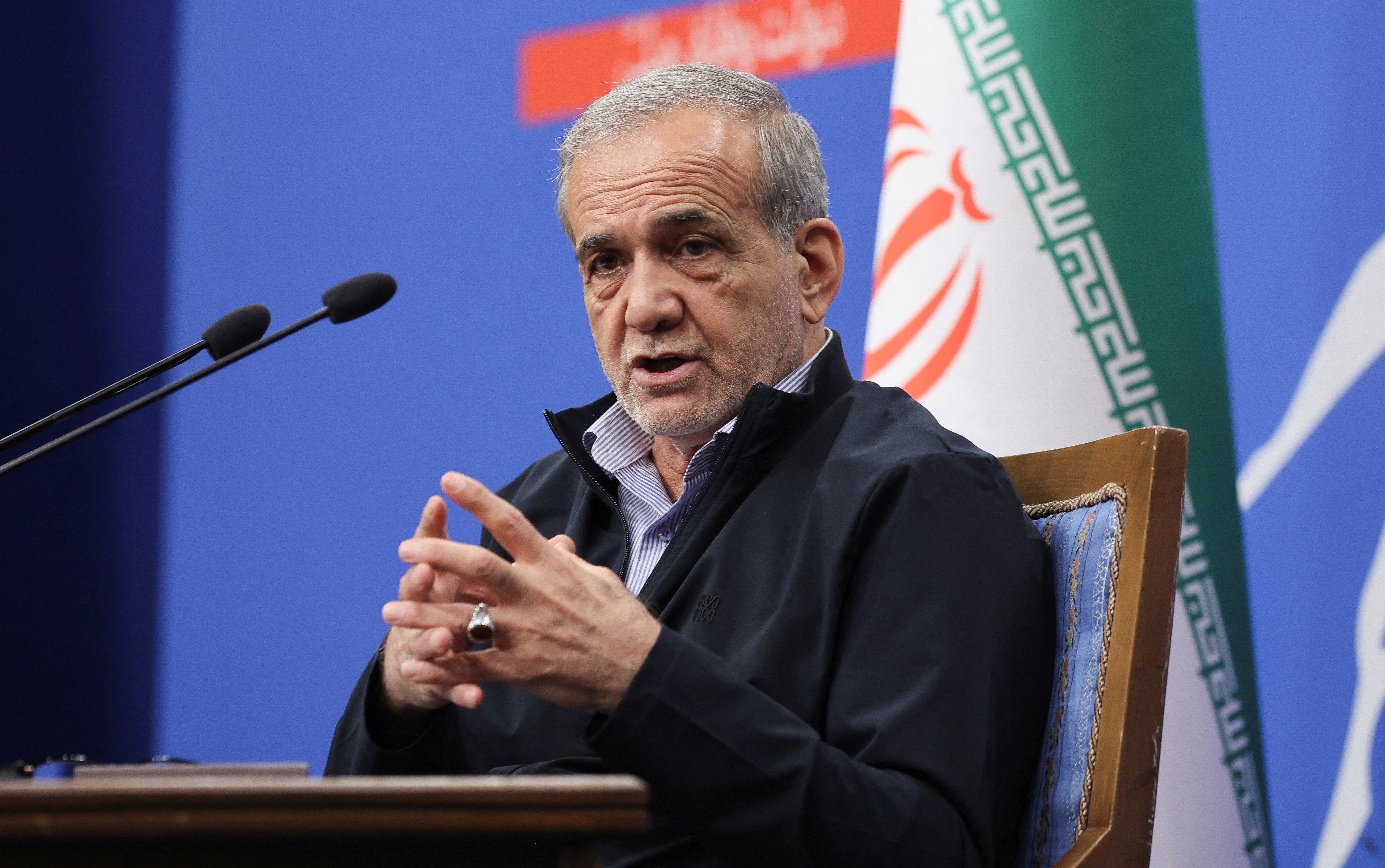During his first press conference, Iranian President Masoud Pezeshkian said that Iran was open to a new nuclear agreement with the United States, but he stressed that the U.S. would have to abide by its commitments this time.
The new reformist president ran on a platform of seeking sanctions relief through renewed negotiations on the nuclear issue, and he won an unexpected victory in the second round in July. Pezeshkian’s comments this week were the latest sign that he intends to make good on his pledge to improve relations with Western governments. It remains to be seen if anyone in the U.S. or Europe is prepared to take him up on his offer.
Speaking to reporters, Pezeshkian defended Iran’s responses to U.S. sanctions, saying that Iran’s nuclear program had expanded as much it has over the last five years because of the pressure campaign that began with President Donald Trump’s decision to renege on the nuclear deal. According to the Associated Press report, he said, “We adhered to the framework written in the (nuclear deal). We are still looking to maintain those frameworks. They tore them, they forced us to do something.”
The record backs Pezeshkian up on this. It was the U.S. that undermined the nuclear deal by pulling out of it and reimposing broad sanctions. Iran was in full compliance with the requirements of the agreement when the U.S. broke its promises, and it remained in full compliance for another year before it began to respond to pressure by expanding its program. Then it was the U.S. that refused to reenter the original agreement when it had the chance to do so. There was an opportunity to revive the JCPOA three years ago, but the Biden administration squandered it.
The original Joint Comprehensive Plan of Action (JCPOA) is now for all intents and purposes defunct, and many of its provisions have either already expired or soon will, so a new agreement will have to be negotiated. The good news is that the Iranian government has said that it is interested in using the JCPOA as a framework. Pezeshkian affirmed this during the press conference: “We are seeking a return to the framework of the nuclear deal. If they stop, we shall stop, too. If they are committed to the accord, we will be, too.”
There have been several encouraging signs in recent months that the Iranian government is serious about reviving negotiations on the nuclear issue. The president appointed Abbas Araghchi as foreign minister. Araghchi was part of the Iranian diplomatic team that negotiated the JCPOA, and his experience with the earlier agreement would likely be very helpful in hammering out a new one.
Iran’s Supreme Leader Ali Khamenei publicly opened the door to new talks last month to show that he was willing to let Pezeshkian move forward with this part of the president’s agenda. Iran’s reformist president received a green light to enter into talks, but he requires credible negotiating partners in the West to succeed.
The Iranian president emphasized the need for reciprocity and mutual respect if there was to be any chance of making progress on this issue. He made clear to the U.S. that continuing with the pressure campaign would not work: “We are not seeking nuclear [arms]. But we will not bow down to pressure.” Pezeshkian is going about as far as anyone in the Iranian system can go to extend an olive branch, and the U.S. and its allies need to respond positively to what he is proposing.
Pezeshkian acknowledged that there would be no diplomatic progress this year before the U.S. presidential election. The Iranian government is waiting to see whether there will be anyone in Washington interested in a diplomatic solution. So far neither major party candidate has indicated that diplomacy with Iran will be a priority next year, but there is an opening here that a new administration would be wise to exploit. Iran is open to finding a compromise, but will anyone in the West take yes for an answer?
We know that there are significant obstacles to new nuclear negotiations. The ongoing war in Gaza and the latest Israeli attack inside Lebanon threaten the peace of the entire region. It is possible that this chance for nuclear diplomacy could be lost if Israel invades Lebanon again. There also continues to be substantial opposition in Washington to any engagement with Iran. The Israeli government under Benjamin Netanyahu has worked for years to derail any diplomatic solution to the nuclear issue. As challenging as these obstacles may be, they are not insuperable if a new administration in Washington is prepared to make a sustained effort to reach a new agreement. The JCPOA is proof that it can be done, and the record of the last six years shows us what happens without a functioning nonproliferation agreement.
Any new diplomatic initiative with Iran will face stiff headwinds, but the record clearly shows that a negotiated compromise is the only reliable way to limit Iran’s nuclear program and reduce tensions. The U.S. and Israel have tried economic warfare and sabotage, and both have backfired spectacularly as Iran’s nuclear program is now more advanced than it has ever been.
Despite years of additional sanctions and Israeli attacks on its program, the Iranian government still chooses not to pursue nuclear weapons, but in the absence of a diplomatic solution the nuclear issue will remain a vexing problem for the region. A negotiated solution remains the best and only way to ensure that Iran’s nuclear program remains peaceful and to deprive Iran hawks of their pretext for war.
- European parliament takes a hard line on Iran ›
- The moderate wins in Iran. So what does it mean for the US? ›
















